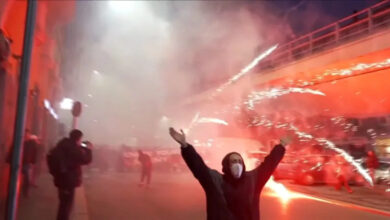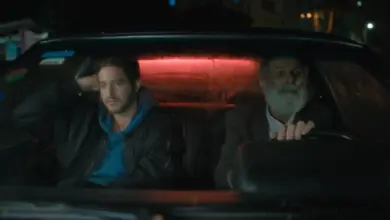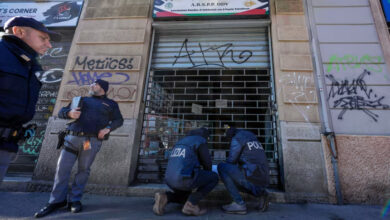Like previous days, the final day of the Alexandria Film Festival for Mediterranean Countries failed to attract a large number of people. Only a few jury members, critics and journalists congregated at the Green Plaza movie complex to watch the three films set to be screened for the day: the 2009 Egyptian production "One-Zero," the 2009 Albanian production "Alive," and the 2009 Italian production "La Pivellina."
A common theme linking all three films was social woes, whether the socioeconomic struggles of the different strata of Egyptian society, or the division between the urban and the rural in Albania, or the marginalized communities living in the outskirts of Rome.
The mosaic narrative of "One-Zero," which follows the lives of several markedly different characters, was by far the strongest and best-attended film, even though it premiered in Egyptian cinemas over a year ago. The film, directed by Kamla Abu Zekri, showcases a day in the lives of several struggling characters, interwoven as the city prepares to watch the African Cup final between Egypt and Ghana. Six main characters confront a different set of socioeconomic stigmas and complexities, all of which give a poignant and accurate portrayal of present-day Egyptian society.
The six main characters include Niveen (played by Ilham Shahin), an older, rich Coptic woman who is battling with the church over her desire to re-marry following news of her pregnancy by her young love, Sherif (played by Khaled Abou al-Naga), a famous TV presenter who abuses alcohol as a means to escape the challenges that come with being in the public eye. Nina, aka “Nesrine,” (played by Zeina) is a pop-singer who recently shot to fame as a new sex symbol and is pitted against her sister, Riham (played by Nelly), a conservatively veiled nurse who refuses to accept the concept of compromising one’s beliefs in order to make ends meet. Hoda (played by Intisar) is a beautician perennially at odds with her own humiliations and constantly battling her hairdresser son, Adel (played by Ahmed al-Fishawy), as they struggle to earn a living.
Each element of the film is in fact very strong and well-executed. The star-studded cast doesn’t disappoint. Kamla Abu Zekri excels in her directorial role, supported by a carefully mastered script written by Mariam Naoum. Editor Mona Rabie manages to maintain the tempo of the film as we move from one story to the next and cinematographer Nancy Abdel Fattah brilliantly enhances the film with a variety of techniques which include raw documentary-style footage, hand-held camera shots with the flavor of realism, and carefully planned close-up shots.
The Albanian production, "Alive," stands in stark contrast. It is a film that disappoints because of the weakness of all its elements.
The movie narrates the story of Koli, an Albanian student originally from the country, who moves to Tirana, the capital city, in order to complete his studies. His father dies while he is away, and when Koli travels home for the funeral he finds himself in the middle of an old feud between two families, including his own. He is advised to remain in the country, but in hiding, since he is now the target of this feud. Eventually, he decides to return to the city and attempt to resume the life he was accustomed to, with disastrous consequences.
There are many problems with this film. Because of a very weak script, the film lacks well-rounded characters and most of the dialogue is awkwardly punctuated by inexplicable moments of silence. There are several themes which could have strengthened the film had they been explored properly. The theme of the urban vs. rural mind-set, pitting the traditional against the modern, was hinted at but should have been a more central theme of the film.
Throughout his journey, Koli meets different people, whether in the city or in the village, but we never come to understand the real reason for their inclusion in the film. For example, during his time in hiding, Koli notices an attractive, much-older woman, dubbed the village “pool girl” because she lives in one of the village’s few lavish houses. They meet and we see several moments of attraction between the two, but then she disappears with there being no reason given for her involvement in the story to begin with. In a similar fashion, we are introduced to Zef, a family friend who agrees to take Koli in once the family decides that he should go into hiding. At first, Zef seems like a pleasant and kind man. Only later do we discover that he is in fact an alcoholic and abuses his children. There is no reason given for his problems. Likewise, a shirt-less man galloping on a horse makes several random appearances without ever being introduced nor any reason given for his existence.
The acting throughout is quite shallow and weak and puts into question the directorial skills involved. The only glimmer of hope lies in the occasionally pleasing cinematography, which contrasts images between the city and the country.
The Italian production, "La Pivellina," was a slightly flavorless ending to the day. The movie tells the story of Patty, a middle-aged woman who, while searching for her lost dog in a park, finds an abandoned two-year-old girl. She decides to take her back home and the movie documents her time with the child and the bond that ensues.
Nothing really happens in the film; the main incident is the finding of the child, which takes place at the start of the movie. We are instead immersed in Patty’s routine, and that of her husband, Walter, and their neighbor, a child named Teiro, as they collaborate to take care of the little girl. The documentary-style film becomes quite monotonous and, in trying to understand more about the characters and the reason behind the girl’s abandonment, we are provided with scant clues.
Midway we come to discover that both Patty and Walter work in a circus and their limited income forces them to live in parts of Italy outside of Rome considered to be shanty areas. One of Walter’s main concerns when they first take in the child is the prospect of the police finding out. Several times he points out that they are in a weak position in the eye of the law (they are considered to be outcasts of sorts) and thus, rather than it being seen as them taking care of the little girl, he believes they would be charged with kidnapping. But we are never shown the real circumstances behind his statements and why he believes they are seen as outcasts.
The real delight of this movie is the little girl, Aia. She is truly the star of the film, breaking the monotony and giving some meaning to the work. The young girl goes through a noticeable transition during the film, at first somewhat apprehensive of her new guardians but, by the end, growing genuinely happy with them. This rendered her the strongest actor in the film.
The closing day of the Alexandria Film Festival for Mediterranean Countries served as a reminder of the intrigue in using films as a medium to present socioeconomic issues, but also of the disappointments that come when filmmakers fail to produce compelling projects.




